Recovering Hegel from the Critique of Leo Strauss
Recovering Hegel from the Critique of Leo Strauss
The Virtues of Modernity
Sara MacDonald and Barry Craig
LEXINGTON BOOKS
Lanham Boulder New York Toronto Plymouth, UK
Published by Lexington Books
A wholly owned subsidiary of Rowman & Littlefield
4501 Forbes Boulevard, Suite 200, Lanham, Maryland 20706
www.rowman.com
10 Thornbury Road, Plymouth PL6 7PP, United Kingdom
Copyright 2014 by Lexington Books
All rights reserved. No part of this book may be reproduced in any form or by any electronic or mechanical means, including information storage and retrieval systems, without written permission from the publisher, except by a reviewer who may quote passages in a review.
British Library Cataloguing in Publication Information Available
Library of Congress Cataloging-in-Publication Data
MacDonald, Sara (Sara Jane)
Recovering Hegel from the critique of Leo Strauss : the virtues of modernity / Sara MacDonald and Barry Craig.
pages cm.
Includes bibliographical references.
ISBN 978-0-7391-8397-7 (cloth : alk. paper)ISBN 978-0-7391-8398-4 (ebook)
1. Hegel, Georg Wilhelm Friedrich, 17701831. 2. Strauss, Leo. 3. Civilization, Modern. I. Title.
B2948.M136 2014
193dc23
2013034366
 TM The paper used in this publication meets the minimum requirements of American National Standard for Information Sciences Permanence of Paper for Printed Library Materials, ANSI/NISO Z39.48-1992.
TM The paper used in this publication meets the minimum requirements of American National Standard for Information Sciences Permanence of Paper for Printed Library Materials, ANSI/NISO Z39.48-1992.
Printed in the United States of America
To Patrick, Mary, and Catherine
Preface
We have both been fortunate to have good teachers throughout our respective educations. To one of us, while an undergraduate student at St. Thomas University, political philosophy was introduced by Professors Rick Myers and Patrick Malcolmson. This introduction, which included the first reading of Leo Strauss, was deepened during graduate study at Fordham, through the guidance and help of Mary Nichols, Michael and Catherine Zuckert, and Michael Davis. While both scholars are generally counted as Straussians, the breadth of their thought, as well as their intellectual generosity, encouraged students to look beyond any narrow ideological approach. Thus, it was there also that Hegel became an object of study. To the other of us, Leo Strauss was introduced via the many hours spent in and out of class with the Canadian political philosopher George Grant, an ardent admirer of Strausss work and equally ardent critic of Hegel. Hegel was introduced by Grants colleagues Wayne Hankey and James Doull, the latter a relatively unknown Canadian thinker, who was nevertheless once described by Emil Fackenheim as the only Hegelian. Now, from a distance of some thirty years, the depth and rigor of their scholarship is even more impressive. Since our initial respective exposures to Strauss and Hegel, a couple of decades of intellectual ferment, and countless conversations over glasses of wine, have led to this present work.
While the ancient world has its attractions, and indeed, in our view, though the thought of Aristotle, and especially Plato, remains the source of understanding out of which all subsequent western thought has grown, and without which none of subsequent western thought can be truly comprehended, we cannot accept the ancient social order in which such thought was born. Leo Strauss was initially attractive to us, as he has been to countless others, because he was unafraid to cast a critical eye on many of the intellectual sacred cows of modernity. His radical re-appropriation of ancient thought and his idiosyncratic readings of the history of philosophy caused us to challenge our own preconceptions and unexamined assumptions about the world in which we live. Questioning whether or not democracy was simply good, or whether freedom and equality were, by themselves, adequate conditions for human flourishing was both challenging and exhilarating at the same time. In Strauss the challenge of historicism and its effects on the possibility of knowledge or truth was presented in a clear and provocative manner.
And yet, we both had long harbored an unsettling apprehension that this conservative critique of modernity, while justified in many particulars, was incomplete, if not simply wrong, in some fundamental way. The progress of womens right alone, let alone the abolition of slavery and the recognition of other fundamental and universal human rights seemed to us such undoubted goods and so clearly products specifically of modernity that we could not ultimately remain satisfied with Strausss account. Thus, about a decade ago, we began putting together the argument of this book. While one of our teachers, Robert Crouse, once wisely cautioned against enshrining any one philosopher as possessing the absolute truth, we nevertheless believe that Hegel had a more complete account of the end and purpose of human life than any thinker before or since. That is because Hegel labored to produce a philosophic system that included both the objective and absolute together with the subjective elements of reality. Despite the many limitations of Hegels thought, some caused by the particularities of his own historical epoch or the incompleteness of his historical and cultural scholarship, he offered the best opportunity for uniting what was good about the thought of Greek antiquity (i.e., an account of transcendent truth and human virtue) with what was best about the spirit of modernity (i.e., human freedom and individual subjectivity).
The history of Hegelian scholarship, as is well known, is a tale of disagreement and division. For the most part, and this began immediately upon Hegels death, the camps of interpretation have been divided between the Left and the Right of the political spectrum. Uncomfortable with the absolute forms of either ideology, we instead found in Hegel a middle ground (we are far from the first to discover this) which offered a way out of the polarization of political thought, and indeed, contemporary culture wars. This reading, which owed much to the thought and writings of James Doull, recovered the objective side of Hegels thought while insisting on the value of his insistence on subjective freedom. That he took seriously Hegels religious thought perhaps offers a partial explanation of why Doulls own work was not embraced in the mainstream of contemporary western philosophy. Rather than opposing duty and rights, law and freedom, or objective truth and subjective feeling, Doull demonstrated that Hegels thought brought together those opposed sides as not only compatible but necessary elements of the whole. From this, it is possible for a conservative who values the thought of Plato and his account of the Good to see the necessity of freedom and individual self-consciousness if this idea is to be manifest in the world.
As is clear from the many references in the text to the work of others, we recognize that elements of this argument have been advanced by other scholars, both within and outside of the Straussian school and across various strands of the Hegelian schools. Hopefully, in this book we have succeeded in gathering up many of these elements and presenting them them in a way that is at once accurate and fair as well as clear and accessible both to non-specialist readers and to students of political philosophy who have an interest in the thought of both Hegel and Strauss. In our efforts towards clarity and accessibility, we have necessarily resisted engaging in depth many of the technical aspects of Hegelian thought. Given the widely divergent interpretations that surround both thinkers, we are cognizant that some of the interpretations we have advanced, of both Hegel and Strauss, and some of the conclusions we have drawn with respect to contemporary social and political developments, will not go without criticism. However, at the very least, it is our hope that we have offered something new to the conversation and have enabled a reconsideration of one element of contemporary political philosophy.
Next page
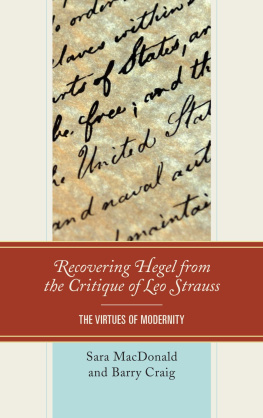
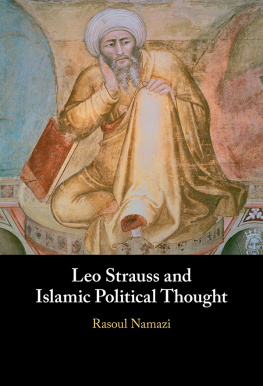
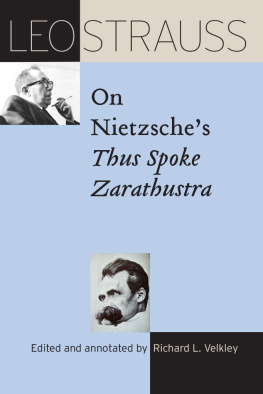

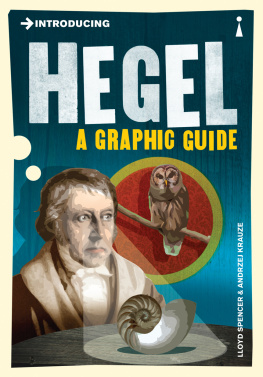

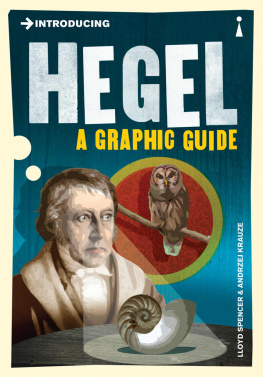
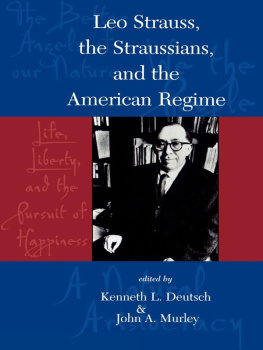
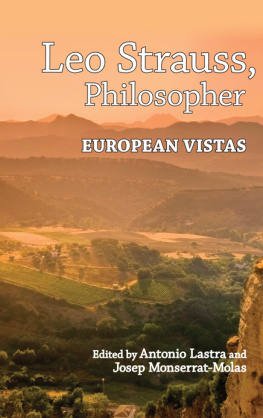
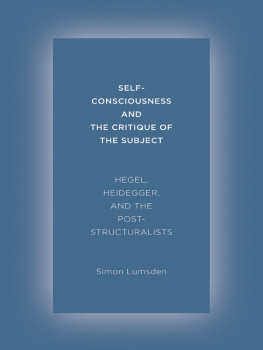
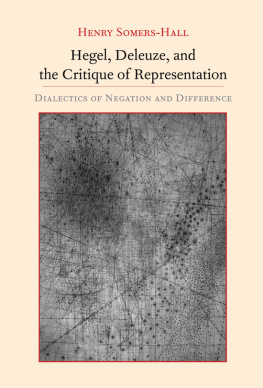
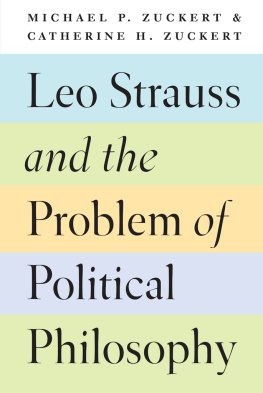

 TM The paper used in this publication meets the minimum requirements of American National Standard for Information Sciences Permanence of Paper for Printed Library Materials, ANSI/NISO Z39.48-1992.
TM The paper used in this publication meets the minimum requirements of American National Standard for Information Sciences Permanence of Paper for Printed Library Materials, ANSI/NISO Z39.48-1992.